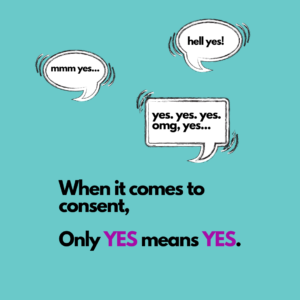Consent – A short, yet impactful word
By Kailee Burkinshaw
Consent – A short, yet impactful word
What is one of the first things you think of when you hear the word “consent?”
Is it the term “no means no?” What about consent or permission forms from when you were in school? Or when it involves social movements such as the #MeToo hashtag? Consent can be all of these things and more.
Consent is a term that has always been around, but it may not have been as widely talked about as it appears to be now in our news, media, classrooms or virtual worlds. This is why it is important to understand consent and what it involves. Knowing more about consent creates a more informed, respectful and safe world, for reasons this blog post will discuss.
When someone is talking about consent, it begins as an agreement between two people or groups that they want to do something together. Everyone can say “yes” in the agreement, especially after they know what they are agreeing to do. Someone can say “no” in the agreement too.
Framing consent this way can put into perspective how we have all been practicing consent our entire lives.
Have you ever asked a friend to hang out with you? Asked a colleague if you can eat lunch with them? Asked someone out on a coffee date? Indicated to someone you liked that you wanted to hold their hand or kiss them?
If you have said “yes” to any of these questions, then you have been practicing consent.
Continuing to seek someone’s consent and have other people respect your choices when it comes to consent, is the cornerstone of creating healthy, respectful relationships in our lives.
The CASASC education team has regular conversations in our Central Alberta community about consent and healthy relationships. To learn more about these conversations and opportunities, you can reach out to the team at education@casasc.ca.
What is involved with consent?
Consent can start with a simple “yes” or “no” question. Consent can involve letting someone know all of their options when it comes to settings in the medical field, higher education or the workplace.
We have consent in our friendships, within our families and with our dating partners. From high fives, to hugs, and all the way up to and including all forms of sexual activity, we need to practice and be receptive to consent.
But how do we get consent? How do we know we are receiving the right signals for consent? And do we have to be crystal clear every time we ask for consent?
When asking for consent, there needs to be the following considerations:
- How well do you know this person? Is it your first time meeting them, or have you known them a long time? What sort of relationship do you have with them? Do you know what sort of activities they are comfortable with?
- How does the other person express a “yes” or “no” with their words or actions? Can you yourself recognize them?
- Does the person you are asking know all of what they are agreeing to?
- Is the person you are asking consent from in an alert, sober, conscious and sane state of mind to understand what you are asking of them?
When we reflect on our relationships with other people, and the sort of agreements we have with them because of our relationship to them, we can better understand how asking for and receiving consent will work with them.
Consent- Easy as FRIES and OYMY
Consent needs to be enthusiastic, specific and informed. It also needs to be reversible—someone can say “yes” but can say “no” later if they change their mind—and freely given. We do not force someone to say “yes.” Rearranging these words can give us the term FRIES, an easy way to remember the parts of consent.
Another way to remember consent is with the term “Only Yes Means Yes.” CASASC has adapted this term into a series of posters under the “Only Yes Means Yes (OYMY)” campaign. More information on the campaign can be found here: https://casasc.ca/only-yes-means-yes-when-it-comes-to-consent/. If you are interested in posters for your business or organization, you can reach out to CASASC’s EDU Team at education@casasc.ca.
Consent is an everyday practise and can be a way to honor and show respect and safety in our relationships and community.
Kailee Burkinshaw is a prevention educator with the Central Alberta Sexual Assault Support Centre.


